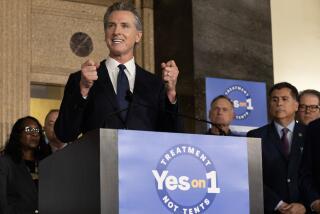Cranston, Zschau Clash on Money Bills
- Share via
The fundamental clash in philosophy between Democratic Sen. Alan Cranston and his Republican challenger, Rep. Ed Zschau, came to the fore Tuesday in Los Angeles, as Cranston tried to make an issue of votes that Zschau has cast against appropriations to keep the federal government running.
In Cranston’s view, Zschau was “irresponsible” in 1985 when he voted against eight major appropriations bills that, among many other things, included funding for drug control, air safety, medical care for veterans and child nutrition programs.
“I often vote for amendments to change certain programs either up or down,” Cranston said at a press conference, “but in the final analysis, I almost invariably vote for the (appropriations) measure. . . . If you don’t have a sense of compromise and finally accept something that will keep the government going, you are voting to shut down the United States government.”
Zschau’s Case
That, Zschau said a little while later, is the case that he is trying to make against Cranston.
“What happens is politicians take a popular bill and load it up with pork barrel and then they dare you to vote against it,” Zschau said. “I vote against it to express my opposition to runaway federal spending. . . .
“The contrast in philosophy (with Cranston) is that if I feel that an appropriation bill is over the budget, which most of them were, I vote for freeze amendments or to cut the spending because in a time when we are facing a $200-billion deficit, we have to exercise restraint across the board.”
But, Zschau was asked, what about Cranston’s argument that you fight to cut appropriations up until the final vote but then you vote to keep the government functioning?
“That’s his approach,” Zschau replied. “Of course, he doesn’t make the fight, but he says we have to keep the spending going and I say this: If you don’t draw the line and say, ‘These levels (of spending) are unacceptable and I’m not going to be on record as supporting them,’ you haven’t made your case.”
Zschau argued that his votes would not have cut off the money to the programs but would simply have forced Congress to come up with lower levels.
Clean Water Act Vote
“He (Cranston) has attacked me for being against the Clean Water Act in 1985,” said Zschau, denying that his vote meant that he opposed the concept of cleaning up water supplies.
“But in point of fact, in 1985 there was a $2-billion increase in the level of spending on the House side for the Clean Water Act. I said I cannot in good conscience support a jump of $2 billion.”
For Zschau, the downside of Tuesday’s exchange was that he once again found himself responding to Cranston’s charges rather than setting the Senate race agenda.
So far, Zschau has tried to run an upbeat campaign that presents him as “a leader for California’s future.” But increasingly, strategists within his own party are contending that to give voters reasons to reject the incumbent Cranston, Zschau must begin a sustained attack.
Asked Tuesday if planned to do that, Zschau said he will be criticizing Cranston’s record on a number of fronts, but added:
“I’m going to stay on the high road. I am not going to misrepresent his record or use character assassination.
“He has put out a TV ad saying that I am like Sen. Jesse Helms (R-N.C.). He knows better than that. On the one South African sanctions bill that both the House and Senate considered in 1985, I voted for it and Helms voted against it.
“I will not stoop to the tactics that Cranston has, what I call sleazy politics.”
More to Read
Get the L.A. Times Politics newsletter
Deeply reported insights into legislation, politics and policy from Sacramento, Washington and beyond. In your inbox twice per week.
You may occasionally receive promotional content from the Los Angeles Times.










